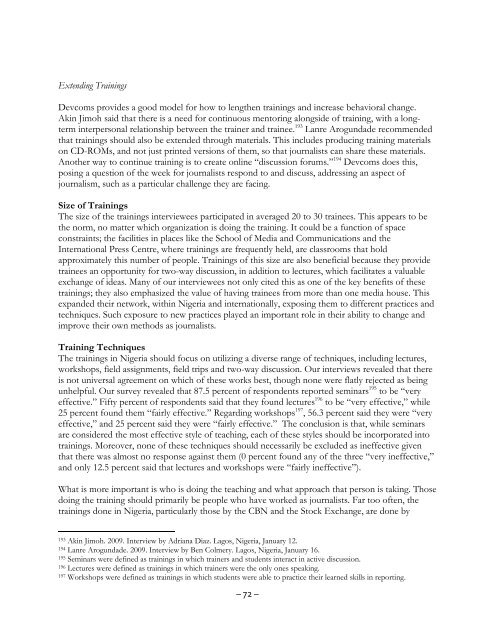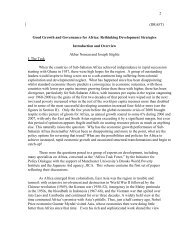Extending TrainingsDevcoms provides a good model <strong>for</strong> how to lengthen trainings and increase behavioral change.Akin Jimoh said that there is a need <strong>for</strong> continuous mentoring alongside of training, with a longterminterpersonal relationship between the trainer and trainee. 193 Lanre Arogundade recommendedthat trainings should also be extended through materials. This includes producing training materialson CD-ROMs, and not just printed versions of them, so that journalists can share these materials.Another way to continue training is to create online “discussion <strong>for</strong>ums.” 194 Devcoms does this,posing a question of the week <strong>for</strong> journalists respond to and discuss, addressing an aspect ofjournalism, such as a particular challenge they are facing.Size of TrainingsThe size of the trainings interviewees participated in averaged 20 to 30 trainees. This appears to bethe norm, no matter which organization is doing the training. It could be a function of spaceconstraints; the facilities in places like the School of Media and Communications and theInternational Press Centre, where trainings are frequently held, are classrooms that holdapproximately this number of people. Trainings of this size are also beneficial because they providetrainees an opportunity <strong>for</strong> two-way discussion, in addition to lectures, which facilitates a valuableexchange of ideas. Many of our interviewees not only cited this as one of the key benefits of thesetrainings; they also emphasized the value of having trainees from more than one media house. Thisexpanded their network, within Nigeria and internationally, exposing them to different practices andtechniques. Such exposure to new practices played an important role in their ability to change andimprove their own methods as journalists.Training TechniquesThe trainings in Nigeria should focus on utilizing a diverse range of techniques, including lectures,workshops, field assignments, field trips and two-way discussion. Our interviews revealed that thereis not universal agreement on which of these works best, though none were flatly rejected as beingunhelpful. Our survey revealed that 87.5 percent of respondents reported seminars 195 to be “veryeffective.” Fifty percent of respondents said that they found lectures 196 to be “very effective,” while25 percent found them “fairly effective.” Regarding workshops 197 , 56.3 percent said they were “veryeffective,” and 25 percent said they were “fairly effective.” The conclusion is that, while seminarsare considered the most effective style of teaching, each of these styles should be incorporated intotrainings. Moreover, none of these techniques should necessarily be excluded as ineffective giventhat there was almost no response against them (0 percent found any of the three “very ineffective,”and only 12.5 percent said that lectures and workshops were “fairly ineffective”).What is more important is who is doing the teaching and what approach that person is taking. Thosedoing the training should primarily be people who have worked as journalists. Far too often, thetrainings done in Nigeria, particularly those by the CBN and the Stock Exchange, are done by193 Akin Jimoh. 2009. Interview by Adriana Diaz. Lagos, Nigeria, January 12.194 Lanre Arogundade. 2009. Interview by Ben Colmery. Lagos, Nigeria, January 16.195 Seminars were defined as trainings in which trainers and students interact in active discussion.196 Lectures were defined as trainings in which trainers were the only ones speaking.197 Workshops were defined as trainings in which students were able to practice their learned skills in reporting.– 72 –
people who have no journalism background. Akin Jimoh recommended that trainings be led byexperienced business journalists and media specialists. 198However, there are benefits to recruiting a mix of trainers and presenters who are not strictlyjournalists. In fact, we heard from several in our sample who said that they would like more peoplefrom the business community to speak at trainings. This would give journalists an opportunity tolearn about the complexities of various industries and the challenges they face, from the insiderperspective. Since many journalists lack finance training, according to one <strong>for</strong>mer journalist nowworking in a bank, they do not fully understand the intricacies of the companies they cover or theimplications of what they write. 199 Jimoh also recommended bringing in development experts, suchas representatives from the United Nations Development Program. 200.The other training technique issue is whether to employ a conceptual style versus a practical style.The education journalists receive in university tends to be very conceptual, with very little practicaltraining, as is also the case of the trainings conducted by organizations like the CBN and the StockExchange. Journalists have very little exposure to hands-on training, on the whole, and wouldbenefit greatly from trainings of this kind. It is important, though, not to strictly deviate from theconceptual side of training. Dean Emevmo Biakolo, of the School of Media and Communications,recommended mixing academic teaching with practical skills, which is what he finds many editors inNigeria are looking <strong>for</strong>. 201Trainings <strong>for</strong> Editors and PublishersTrainings should not be <strong>for</strong> journalists alone; they should also include editors and publishers. Thiswill raise their understanding of the business issues their journalists are covering. According to thejournalists we spoke with, the majority of their editors have had little business reporting training.Training editors and publishers will also increase the likelihood that they will allow their journaliststo adopt their new skills resulting from trainings, as the knowledge of business reporting spreads.Devcoms, <strong>for</strong> example, holds trainings <strong>for</strong> editors so that they can better understand certain beatsand identify false and biased stories. These trainings also update editors on the latest trends in thesector. Furthermore, Joke Omotunde of the United States Consulate Public Affairs Section in Lagossaid that journalists often tell her that their trainings should teach editors and publishers tounderstand the importance and benefit of increasing journalists’ pay. 202Funding <strong>for</strong> TrainingsIn order to ensure that Nigerian journalists will utilize trainings, it will be important to remove thecost barrier to attending. Media houses have very limited resources to pay <strong>for</strong> training, and severaljournalists noted that it is the first thing to go in times of economic downturn. If possible,journalists should have these trainings provided to them without cost. Otherwise, it will greatlydecrease the likelihood of journalists attending.198 Akin Jimoh. 2009. Interview by Adriana Diaz. Lagos, Nigeria, January 12.199 Nigerian Interviewee #5. 2009. Interview by Ben Colmery and Adriana Diaz. Lagos, Nigeria, January 12.200 Akin Jimoh. 2009. Interview by Adriana Diaz. Lagos, Nigeria, January 12.201 Emevmo Biakolo. 2009. Interview by Ben Colmery. Lagos, Nigeria, January 14.202 Joke Omotunde. 2009. Interview by Ben Colmery and Adriana Diaz. Lagos, Nigeria, January 8.– 73 –
- Page 1 and 2:
THEREWILLBE INKA study of journalis
- Page 3 and 4:
AcknowledgementsThis paper has bene
- Page 7 and 8:
Executive SummaryPurpose of the Rep
- Page 9 and 10:
journalists in these countries that
- Page 11 and 12:
Existing International Training Opp
- Page 13 and 14:
• Consumer Affairs and Informatio
- Page 15 and 16:
Background 3Of the three countries
- Page 17 and 18:
pervasive conflict in the Niger Del
- Page 19 and 20:
3) Crises or disruptions, where som
- Page 21 and 22:
Low pay and low regardOne of the mo
- Page 23 and 24:
Even in cases where working journal
- Page 25 and 26:
But while some reporters think FOIB
- Page 27 and 28: When asked how much the media could
- Page 29 and 30: the effects of these challenges for
- Page 31 and 32: detailed analysis of the opportunit
- Page 33 and 34: journalist said he has, however,
- Page 35 and 36: completely make use of some of the
- Page 37 and 38: money. Their knowledge of what medi
- Page 39 and 40: Notes on conducting research in Nig
- Page 41 and 42: Ghana- 35 -
- Page 43 and 44: evenues each year,” 106 which wou
- Page 45 and 46: entertainment news, scandals, and p
- Page 47 and 48: The rise of business-focused journa
- Page 49 and 50: coverage of the oil industry is als
- Page 51 and 52: needed supplementary income to cash
- Page 53 and 54: as supporting one political party o
- Page 55 and 56: Numerous journalists recounted how
- Page 57 and 58: Training programs available to busi
- Page 59 and 60: Amos Safo, editor-in-chief at the p
- Page 61 and 62: Notes on conducting research in Gha
- Page 63 and 64: Background 136Literacy and Educatio
- Page 65 and 66: “sufficient information” about
- Page 67 and 68: or criminal charges for content the
- Page 69 and 70: have such difficulty obtaining info
- Page 71 and 72: The majority of those interviewed b
- Page 73 and 74: commitment to their profession and
- Page 75 and 76: Notes on Conducting Research in Uga
- Page 77: Recommendations for Revenue Watch I
- Page 81 and 82: analyzes business,” he said, “e
- Page 83 and 84: A journalist with The Punch said,
- Page 85 and 86: The Media Foundation for West Afric
- Page 87 and 88: Length of TrainingRoughly three-qua
- Page 89 and 90: industries, for instance, ought to
- Page 91 and 92: otherwise being published in the pr
- Page 93 and 94: Non-Training Recommendations for Ug
- Page 95 and 96: Appendix A: NigeriaPotential Partne
- Page 97 and 98: journalists. Biakolo is very profes
- Page 99 and 100: Television Stations• Nigerian Tel
- Page 101 and 102: have two to four month professional
- Page 103 and 104: City: AccraTelephone: +233 (021) 22
- Page 105 and 106: Fax: +256 414 255 495E-mail: umdf@a
- Page 107 and 108: • What do you think are the most
- Page 109 and 110: Appendix E: Survey Questions1. Name
- Page 111 and 112: 18. How effective were the teaching
- Page 113 and 114: 28. What are the most important cha
- Page 115 and 116: 1. Journalists by Country2. How wou
- Page 117 and 118: 5. How often do you travel out of t
- Page 119 and 120: 9. Which organization(s) sponsored
- Page 121: 12. After completing the training(s














